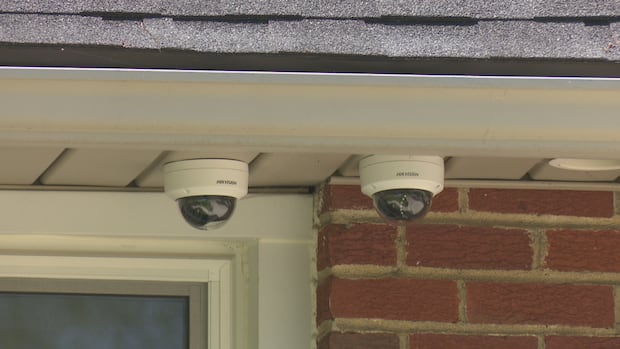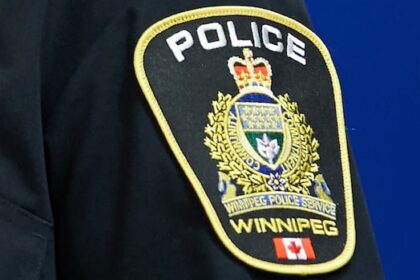New Brunswick·NewThe Safe Neighbourhood Camera Registry is being introduced in Saint John as a way for city residents to take part in efforts to reduce crime.New online registry allows people to make video footage available to police doing investigationsMark Leger · CBC News · Posted: Nov 09, 2025 5:00 AM EST | Last Updated: 30 minutes agoListen to this articleEstimated 4 minutesThe audio version of this article is generated by text-to-speech, a technology based on artificial intelligence.Saint John police say home security footage can help help solve crimes in city neighbourhoods. (Dale Molnar/CBC)Saint John police officers often go door-to-door in city neighbourhoods when they’re investigating crimes, asking residents if they have helpful information. That might include their security camera footage that could be used in the evidence-gathering process.It’s time-consuming work that could become easier with a new program called the Safe Neighbourhood Camera Registry, where people voluntarily register their home security cameras in a database accessible to police during investigations.“We are looking to engage with community members, whether it be the residents or businesses that have exterior outward-facing cameras,” Staff Sgt. Shawna Fowler said. “When an incident takes place in their neighbourhood or close by, something that might be captured by their cameras, we would reach out to them and obtain copies of the evidence.”Saint John Police Force Staff Sgt. Shawna Fowler says the Safe Neighbourhood Camera Registry could help police manage investigations more efficiently. (Submitted by Shawna Fowler)Fowler says the registry would help them more efficiently manage multiple investigations.“We’ve had those major cases this year where time is spent knocking on doors and looking and gathering information for our investigations,” Fowler said. “Being able to have a repository or a data registry program where we can, at our fingertips, find the information instead of being out there knocking on doors.”When people registered their cameras, they would include information like the location and how long footage is stored. Officers could then reach out if they thought archived footage could help in their investigations.They would not have access to live footage for people who have concerns about privacy, said Fowler.“There’s nothing plugged into your house or anything attached to your house, so the information that you are entering into the registry is the only information that we have,” Fowler said. “That doesn’t give me a direct link to your camera.”Engaging citizens in crime reductionJen Brown Oliver, the executive director of the Carleton Community Centre on the west side of Saint John, said people will embrace the idea once they understand how it will help solve and prevent crime in their neighbourhoods.“I think it will take a small incident or something like that, where they can see the benefit of it, because people are always wanting to help, and they’re always offering,” she said.“When you see things happen, people are like, ‘Oh, you check your cameras. Does someone have a camera?’ And then other people are like, ‘Sure, I’ll check my camera.’ I think it could get there. I just think that it’ll take some time.”Many communities nationwide are participating in the national program and others like it.The Prince Rupert Police Service in B.C. started using the registry last year after residents complained the force wasn’t responding quickly to certain types of calls where access to camera footage would have been be helpful.Argyri Panezi, a law professor and Canada Research Chair in digital information law and policy at UNB, can see the public safety benefits if there is widespread participation in the program, but she worries about privacy issues.“What’s the reasonable expectation of privacy of individuals that just walk by, but they’re not doing anything wrong, versus somebody who is committing a crime in front of a camera, right?” Panezi said.She said it’s become more challenging because of the innovations in technology and intersection of the private and public spheres.Fowler says police could respond to more calls in city neighbourhoods if they could save time by accessing home security footage in certain cases they’re investigating. (CBC)“The surveillance tech is to protect our house,” Panezi said. “It’s not necessarily [the intention] to hand in information to the police when there’s an incident in front of our house. Well, maybe the reasonable expectation of privacy that we have as citizens and as individuals changes, right? It evolves as technology evolves.”For police officers like Fowler, the emphasis is on public safety. She said the registry is great way for residents to take part in community efforts to reduce crime.“[People in] our community want a safe, healthy place to live,” Fowler said. “This is very important to have that engagement from them to help us streamline our investigations to get those boots back on the ground, solving crime.”“I used to work in investigations for many years, and I can think of hundreds of situations where it would have been helpful just to know where to look.”ABOUT THE AUTHORMark Leger is a reporter and producer based in Saint John. Send him story ideas to: mark.leger@cbc.caWith files from Information Morning Saint John
Saint John police say home security cameras could help fight crime











